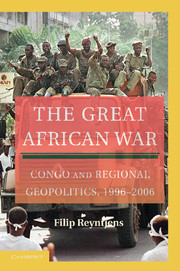Book contents
- Frontmatter
- Contents
- Acknowledgements
- List of Maps
- Introduction
- 1 A Region in Turmoil
- 2 The ‘War of Liberation’
- 3 Massacre of the Rwandan Refugees
- 4 The Fall of the Mobutist State
- 5 Congo: Waiting for Another War
- 6 Impasse in Rwanda and Burundi
- 7 ‘The First African World War’
- 8 Negotiating the Transition
- Conclusion
- Appendix 1 Sources on the killings of Rwandan refugees in early 1997
- Appendix 2 Chronology
- Appendix 3 List of abbreviations
- References
- Index
3 - Massacre of the Rwandan Refugees
Published online by Cambridge University Press: 18 December 2009
- Frontmatter
- Contents
- Acknowledgements
- List of Maps
- Introduction
- 1 A Region in Turmoil
- 2 The ‘War of Liberation’
- 3 Massacre of the Rwandan Refugees
- 4 The Fall of the Mobutist State
- 5 Congo: Waiting for Another War
- 6 Impasse in Rwanda and Burundi
- 7 ‘The First African World War’
- 8 Negotiating the Transition
- Conclusion
- Appendix 1 Sources on the killings of Rwandan refugees in early 1997
- Appendix 2 Chronology
- Appendix 3 List of abbreviations
- References
- Index
Summary
Aborted International Intervention
It has been seen that, under the guise of the ‘Banyamulenge rebellion’, the Rwandan refugee camps in South and North Kivu were systematically attacked with heavy arms. This was just the beginning of a humanitarian disaster. On 29 October 1996, European Humanitarian Affairs Commissioner Emma Bonino accused the international community of remaining idle in the face of a situation she called ‘explosive’: ‘Five hundred thousand people today, probably one million in the coming days are in mortal danger (…). If the Security Council does not act now, I wonder when it will ever act’. The idea of intervention gained momentum on 4 November, when the UNHCR explored the views of the governments in the region with regard to the creation of ‘humanitarian corridors’ for the refugees blocked in Zaire. On the same day, the French section of Médecins sans frontières (MSF) insisted on immediate military intervention to create security zones and to disarm the armed elements among the refugees. Bernard Kouchner launched a vibrant appeal for intervention in Le Monde. MSF evaluated the number of dead among the refugees at over 13,000, a figure that did not include the war casualties. On 8 November, a consortium of some twenty American humanitarian NGOs and a platform of European NGOs in turn demanded the rapid deployment of an international force, while insisting on the need to separate armed and non-armed refugees. France and Spain considered contributing to such a force, while other countries such as the United Kingdom immediately expressed their reticence.
In fact, two diametrically opposed views collided, one insisting on the need for the protection of the refugees, the other on their repatriation.
- Type
- Chapter
- Information
- The Great African WarCongo and Regional Geopolitics, 1996–2006, pp. 80 - 101Publisher: Cambridge University PressPrint publication year: 2009



